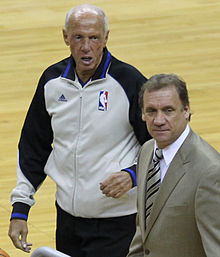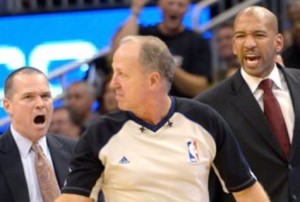 Quick quiz: Who are the only two referees to work the last five NBA Finals?
Quick quiz: Who are the only two referees to work the last five NBA Finals?
Dick Bavetta? Sorry, he hasn’t worked a Finals since 2008. Eddie F. Rush? Nope. Since 2007, he’s only gotten the call once.
Mike Callahan? You’re getting warmer. He’s worked the last three, as have both Derrick Stafford and Monty McCutchen.
Scott Foster? Joey Crawford? Warmer still. Both have worked the last four.
If you answered Dan Crawford and Ken Mauer, take a bow. That duo has the longest current run of sustained excellence among NBA referees.
Now here’s a better question. How many referees who worked any of the last five NBA Finals won’t be working this year’s Finals? Hint: It’s a much longer list.
Working the NBA Finals is unquestionably the pinnacle of the officiating profession. It is what all of them – quietly or outwardly – strive to reach.
I met Mauer in a hotel hospitality suite, about two hours after he had just finished his first NBA Finals assignment in 2006. I asked him how much of a thrill the night had been for him. After he got past the initial shock that someone besides a referee knew how big a deal it was, he smiled broadly and explained how big a deal it was.
Only a dozen guys get picked every year, and if you believe the NBA – and we do, despite some transparency issues – they are chosen through a merit system which grades their performance throughout the regular season and postseason.
As the playoffs progress, the number of referees working games are whittled down for each round. The work roster starts with somewhere between 25 and 30 for the first round and ultimately drops to 12 for the Finals. With very few exceptions, the guys (or gal) who work the most through the postseason draw Finals assignments.
Over the last five years, 60 Finals slots have been available. Those slots have gone to a grand total of just 22 referees. And over the last five years, that group has been cut in half.
The attrition has come via retirement through fulfillment, exhaustion, injury or disenchantment, or via slippage through the merit system. But whatever the reason, the number of elite NBA referees has taken a serious hit over the last five years, a period we like to call the post-Donaghy era.
The exiting group includes Steve Javie, who in all likelihood would have worked the last five Finals had he not been injured in the 2009-10 season. That injury forced Javie to retire after last season.
It also includes Jim Clark, Bob Delaney, Joe DeRosa, Joe Forte, Bernie Fryer and Mark Wunderlich, all of whom have retired as NBA referees since their last Finals assignment. In addition, Bennett Salvatore is sidelined by an injury.
The list also likely will include Bavetta, Rush and Tom Washington, who remain highly active but haven’t been working much in June in recent years. Each has drawn at least two Finals assignments in the last five years but just one in the last two (Rush in 2010).
Unlike other businesses, which often do not replace a departing employee and simply offset the workload upon other employees, NBA referees by and large must be replaced upon departure. There are regulations in place that prevent referees from working too frequently (a) overall, (b) in specific cities and (c) in games involving specific teams in order to maintain a visible level of integrity.
In order to follow those regulations, the referee work force must remain inherently the same size. And with three officials for all 990 games being played over 124 days, that’s nearly 3,000 shifts to cover while being mindful of the above limitations.
Have you seen some names you don’t recognize at the bottom of boxscores? Some unfamilar faces wearing the grey shirts? Join the club. Perhaps not coincidentally, the league has 11 referees with three years or less taking regular assignments this season.
In addition, the NBA also has a half-dozen “guest” referees – Steven Anderson, Scott Bolnick, SirAllen Conner, Matt Myers, Kevin Scott and Ben Taylor – who have worked between eight and 18 games each this season.
As always, there’s been a couple of instances where the officiating could have been better. I have seen Violet Palmer and Zach Zarba – both of whom worked playoff games a year ago – exacerbate obvious missed calls by handing out technical fouls. My boss has seen Josh Tiven exhibit some serious rabbit ears.
And in Phoenix on Tuesday night, Commissioner David Stern said he was “not going to mention the LaMarcus Aldridge and Portland game” on Feb. 6 in which Aldridge was called for goaltending on a clean block of Kevin Durant’s tying drive in the closing seconds that forced overtime in a game eventually won by Oklahoma City. The league admitted the call was wrong the following day.
This is not an indictment of NBA referees, who also have done a darn good job this season of adhering to the points of emphasis. Ridiculous continuation plays that start at the 3-point circle have been virtually eliminated. Defenders are being given more leeway with their line of verticality, whether it be with their hands or body. Palms, carries and travels seem to be called with more frequency.
And as Stern also noted, the league will continue to look at goaltending and other calls that may be subjected to replay review.
In Friday night’s Boston-Philadelphia game, announcer Mike Breen – who has lower-level officiating in his background – pointed out the importance of the use of replay determining whether a shot was a 2-pointer or a 3-pointer. The game could be decided by one point, and the outcome could determine who won the season series, and the tiebreaker could determine who wins the division, and the seeding would determine a first-round playoff opponent. So, yeah, it was kind of important.
However, the job of NBA referee clearly is in a transition period since the  Donaghy disaster in the summer of 2007. There has been a significant shift in the makeup of the workforce, with older, experienced officials being replaced by younger ones. There has been the implementation of a new evaluation system. And there has been an increase in the use of replay, which in general has been a phenomenal addition to the game but can occasionally create more questions than it answers.
Donaghy disaster in the summer of 2007. There has been a significant shift in the makeup of the workforce, with older, experienced officials being replaced by younger ones. There has been the implementation of a new evaluation system. And there has been an increase in the use of replay, which in general has been a phenomenal addition to the game but can occasionally create more questions than it answers.
The playoffs are a month away. It is the one time every season where the NBA gives us a glance at its referee rating system. We are not allowed to see the individual exams, grading curve or dispensing of demerits. But the honor roll becomes public record, noted at the bottom of each postseason boxscore.
And given the attrition of the last five years, it will be interesting to see how the most important games of the season are impacted, if at all, by the referees. They comprise a changing workforce subject to intense public and private scrutiny while trying to excel at a craft that is extremely difficult, bordering on impossible.
Chris Bernucca is a regular contributor to SheridanHoops.com. His columns appear every Wednesday and Sunday. You can follow him on Twitter.
Informative. Thanks.